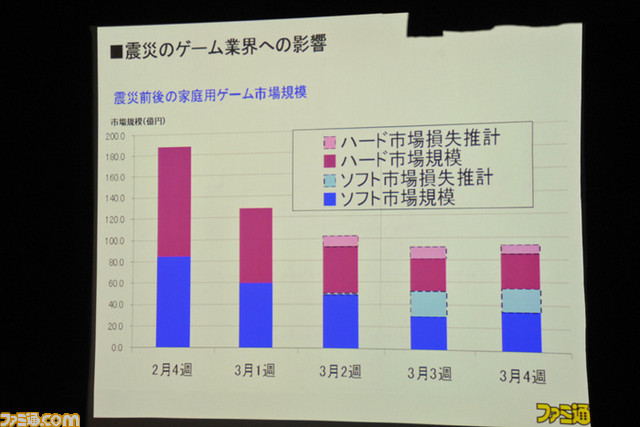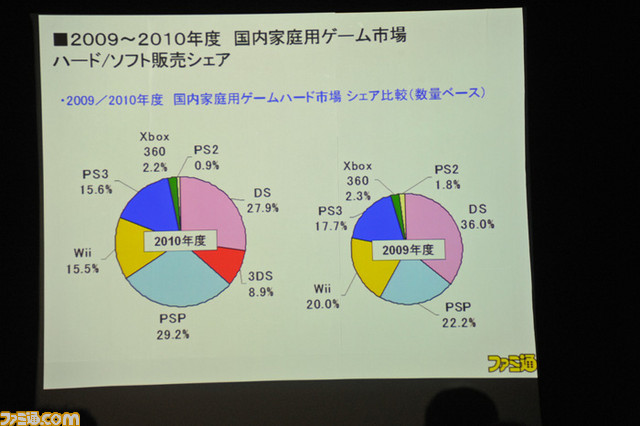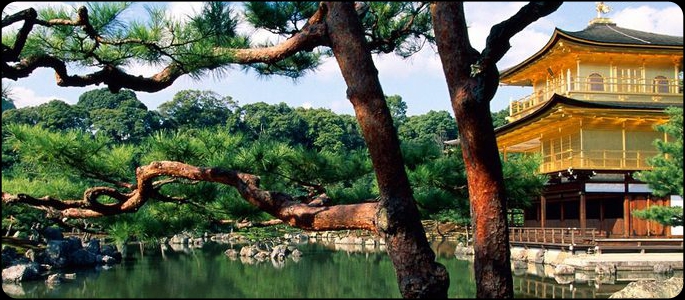Enterbrain, the publisher of top Japanese gaming magazine Weekly Famitsu has announced some interesting figures on the magazine’s official website.
This past weekend, at a seminar in Tokyo, Enterbrain CEO Hirokazu Hamamura delivered some details and company estimates. The first piece of data he spoke on was the headliner, as this conference was subtitled “How Much Did the Disaster Affect the Game Industry?” In the following image, the colored bars are gauges of weekly sales, the leftmost one being the last week of February, the next ones being weeks of March. The dark blue represents software sales while the light purple atop it shows hardware sales. In the second week of March, the light blue shows up, which represents Hamamura’s estimated software sales losses. Pink likewise stands for estimated loss of hardware sales.

While there is a dip from the last week of February to the first week of March, despite the disaster not happening until March 11, it should be noted that late February saw some highly anticipated releases in Japan, including the arrival of the 3DS as well as big software titles like Catherine, Killzone 3, Marvel vs. Capcom 3, LittleBigPlanet 2, Red Dead Redemption, Samurai Warriors 3 Z, and Rune Factory Frontier, just to name a few. Late February was huge and already had an advantage over the first week of March, which explains the visible drop there.
But notice, while weeks 3 and 4 do see big drops in estimated sales, they’re not as big as one might assume. I’m going to add my own analysis of this, as it doesn’t surprise me much. Physically as well as mentally, people need rest. This is no secret; it’s why we have days off work, lest we burn out or end up the ER due to running on nothing but Red Bull and coffee. Year in and year out studies continuously prove that, contrary to its appearance, people who take more breaks and get proper rest are generally more productive than their burned out counterparts. People need rest, not just physically. What some view as laziness is, to an extent, just plain healthy. Oh yes, it can cross the line and that guy Dave that you knew in college that just played Madden and flunked out and wasted his dad’s money is still a loser, but don’t sub him in for anyone calling a time out to jump on some Goombas. Games are amazing things that let us escape reality, if only for a moment.
In times of life-changing distress like this, those people in Miyagi need some games. I see news clips here of kids living in temporary shelters, playing DS and such and feel relieved that at least they have something resembling their old way of life and letting them forget the fact that they now live in a high school gym, if only for a few minutes. Tokyo Disneyland just reopened the other day, and people were literally so happy that they were crying. We need happy diversions in times like this. The whole country of Japan is stressed out about this, even in the unaffected areas, so I say yes, get out there and keep buying games. To me, seeing a kid in a shelter playing a video game and smiling says that things truly are moving back to normal, if slowly. We’ll be OK. I’ll shut up and get back to news now.
Going along with my comments above, Enterbrain’s CEO cited the movie industry’s reactions to disaster, pointing out that on a national scale, it often sees a 120-140 per cent increase in revenue in times following a disaster. People seek the mental breather. Likewise, he is sure the game software and hardware sales dip is just temporary, largely due to shipping difficulties and of course the affected areas needing to put resources into the actual, literal core necessities for survival right now. Another factor in the drop, he said, was that hotly anticipated releases such as Yakuza: Of the End had been delayed.
Also an interesting info bit revealed in this slideshow was the estimated market share of each console. This graph below shows the Wii, PSP, and PS3 getting bumps up from 2009 to 2010, while the PS2, DS, and Xbox 360 lost some ground.

For the next while, Famitsu magazines are being printed on some type of different paper (it’s less glossy, but heck if I know exactly what it is) and containing less pages in general. Since Famitsu is priced based on how many pages it has, this keeps the magazine more affordable in Japan’s tough times.





